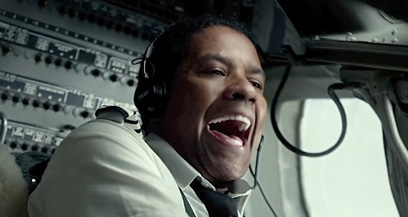Movie Review: Flight
By Matthew Huntley
November 13, 2012
BoxOfficeProphets.com

Denzel Washington, in another one of his signature “great Denzel Washington performances,” plays the troubled Whip Whitaker, the pilot in question. John Gatins’ screenplay makes no attempt to hide the fact Whip is a drunk and a drug user. The film opens with him naked in a bed with one of his flight attendants (Nadine Velazquez) after what’s clearly been another night of binge drinking. To give you an idea of Whip’s problem, he wakes up and washes his out mouth with beer and then offsets the effects of his hangover by snorting cocaine. Within a couple hours, he’s supposed to fly a plane from Miami to Atlanta.
In spite of his lifestyle, our impression of Whip isn’t simply black and white and we don’t automatically find him reprehensible. Yes, under no circumstances should anyone fly a plane with alcohol or other toxins in his system, but because we get the sense this is Whip’s normal state of mind and body, and if he’s lived this long (and flown this many planes) without any problems, he must be competent enough to still perform his job. That's proven near the end of the Atlanta flight when the plane malfunctions, causing two engines to catch on fire and the plane to nosedive. In a harrowing sequence, director Robert Zemeckis shoots from the point of view of the cockpit and we feel like we’re sitting right next to Whip and his co-pilot Ken (Brian Geraghty) as the plane begins to descend. We feel placed in the moment and it has a visceral effect on us.
Without giving away details, Whip finds a way to counter the nosedive and land the plane in an open field outside a church. He awakens in the hospital and only the representative of his pilots’ union, Charlie (Bruce Greenwood), is in the room with him. We’ve already learned Whip is divorced and observed the tension between him and his ex-wife after she calls asking for tuition money for their son.
Almost immediately after he comes to, members of the National Transportation Safety Board question Whip and the events of that day. Such scenes could have played out contrived and predictable, with Whip flying off the handle or bursting out crying, but there’s a quiet truth to them and Zemeckis allows them to play out more like real life than forced melodrama.
At the hospital, Whip meets another drug addict named Nicole (Kelly Reilly), who overdosed on heroin and was being taken to the hospital as Whip’s plane flew over her apartment complex. They have a pleasant conversation in a stairwell and Whip is immediately drawn to her, but the movie wisely avoids suggesting their meeting stems from fate or serendipity. It sees Nicole simply as another lonely soul in need of help who just happened to cross Whip’s path. She will either play a role in his recovery or downfall.
Naturally, Whip’s first reaction to all this is to get away and avoid the media, probably because he fears they’ll discover who he really is and what he did. Meanwhile, his buddy Harling (John Goodman) brings him booze and drugs, but Whip vows to stop drinking and goes so far as to pour out all the booze at his dad’s farm, where Whip decides to hide out for a while. His commitment to stay sober doesn’t last long, though, not after he learns the investigation in the crash requires a criminal lawyer (Don Cheadle) and if the NTSB finds Whip was indeed under the influence, he could be convicted of manslaughter.
Of course, Whip knows he was drunk; Charlie knows he was drunk; the lawyer knows he was drunk; and Whip’s friend and other flight attendant, Margaret (Tamara Tunie), knows he was drunk. The underlying question is whether Whip will come to terms with his dependency and accept the consequences or continue to spiral out of control in self-denial. And because the film knows neither alcoholism nor Whip’s situation are straightforward, it makes it hard for us to predict what he’ll decide, which ups the suspense factor.
As far as performances, Washington proves yet again he’s an actor with enormous range. It helps that Whip is one of the more complex roles he’s played, but Washington is up to the challenge, and in a way he must play against his usual type because Whip can be so unlikable and disgusting at times. And yet, we still care for him. As colorful as the character is, Washington doesn’t play him over-the-top, which must have been tempting given his nature and behavior.
On the other end of that spectrum is Cheadle as the clean-shaven, eloquent, upstanding lawyer. His professionalism is meant to be the antithesis of Whip, but Cheadle restrains himself and lets his appearance, demeanor, delivery and body language convey that symbolism. Washington and Cheadle are a good match here and we sense two masters at work. The other standout is Melissa Leo, who has a small but significant role as the investigator who conducts the climactic hearing at the end. The way she speaks and repeatedly puts on and takes off her reading glasses makes you want to smack her, but that just proves how effective Leo is and how she makes the scene come alive.
It’s rare to find a mainstream Hollywood movie that does more than simply fulfill our expectations. Most high-profile studio pictures affect us emotionally and psychologically, but they remain, for the most part, predictable. The refreshing thing about Flight is we don’t know where it’s going or how it’s going to end. That’s all the more fitting because its main character doesn’t, either. All he does know is the time has come to make a very important choice. Credit to Zemeckis, Gatins and the actors for making us care so much about what he decides.